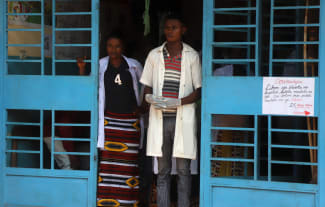Think Global Health is an online bulletin that examines the ways in which changes in health are reshaping economies, societies, and the everyday lives of people around the globe. The articles on this website consider the ways that health influences and interacts with broader social, economic, and demographic trends. Topics range from the growth of cities and the migration of people, to the effects of climate change and trends in global agriculture, to the expansion of international supply chains and the empowerment of women and girls.
The mission of Think Global Health is to provide a compelling forum for examining where and why global health matters and to engage readers in debates and efforts that improve health worldwide. To realize this mission, Think Global Health is committed to featuring and publishing contributors in low- or middle-income countries, and covering issues in global health that have been neglected in the past.
As of June 1, 2022, Think Global Health is offering an honorarium to the lead contributor from a low- or middle-income country. In its coverage, this website seeks to illuminate the ways in which global health is an investment in societies and economies, not just a form of humanitarian or emergency relief. If you have questions about the honoraria, please reach out to us at [email protected].
Think Global Health launched on January 21, 2020. Since then, the site has published more than 1,300 articles from roughly 1,200 authors, representing roughly 110 countries on six continents, and attracting more than 7.1 million page views. Recommendations, analyses, forecasts, interviews, and data visualizations on the site have been circulated widely and many have been featured in or cited by Vox, The Atlantic, New York Magazine, New York Times, Intercept, Washington Post, the BBC, and many others.
Think Global Health is an initiative of the Council on Foreign Relations (CFR) in collaboration with the Institute for Health Metrics and Evaluation (IHME) at the University of Washington. Think Global Health was made possible by a generous grant from Bloomberg Philanthropies.
All statements and views expressed on this website are solely those of the individual contributor(s) and are not necessarily shared by his/her/their institutions. The Council on Foreign Relations takes no institutional positions on policy issues and has no affiliation with the U.S. government.
Who Can Write for Think Global Health?
Think Global Health welcomes outside submissions that provide compelling and timely analysis and sound knowledge that improves the understanding of global health and its evolving role in the world. The current focus areas for the site are: urbanization, climate and the environment, trade, migration, governance, poverty, food policy, aging, migration, and gender. We also welcome pieces on the COVID-19 pandemic, noncommunicable diseases, global institutions, health aid and development, and other related topics.
In accordance with CFR policy, writers may not use the output from generative AI tools and features as a substitute for your own creativity and work product, nor may you submit unedited or lightly edited generative AI content as your own work product. While you can use generative AI to conduct research, you are ultimately responsible for the accuracy of your work.
Founding Editor
Managing Editor
Associate Editor
Associate Editor, Data Visuals
Research Associate
Copyeditor
Kristen Ebert-Wagner







